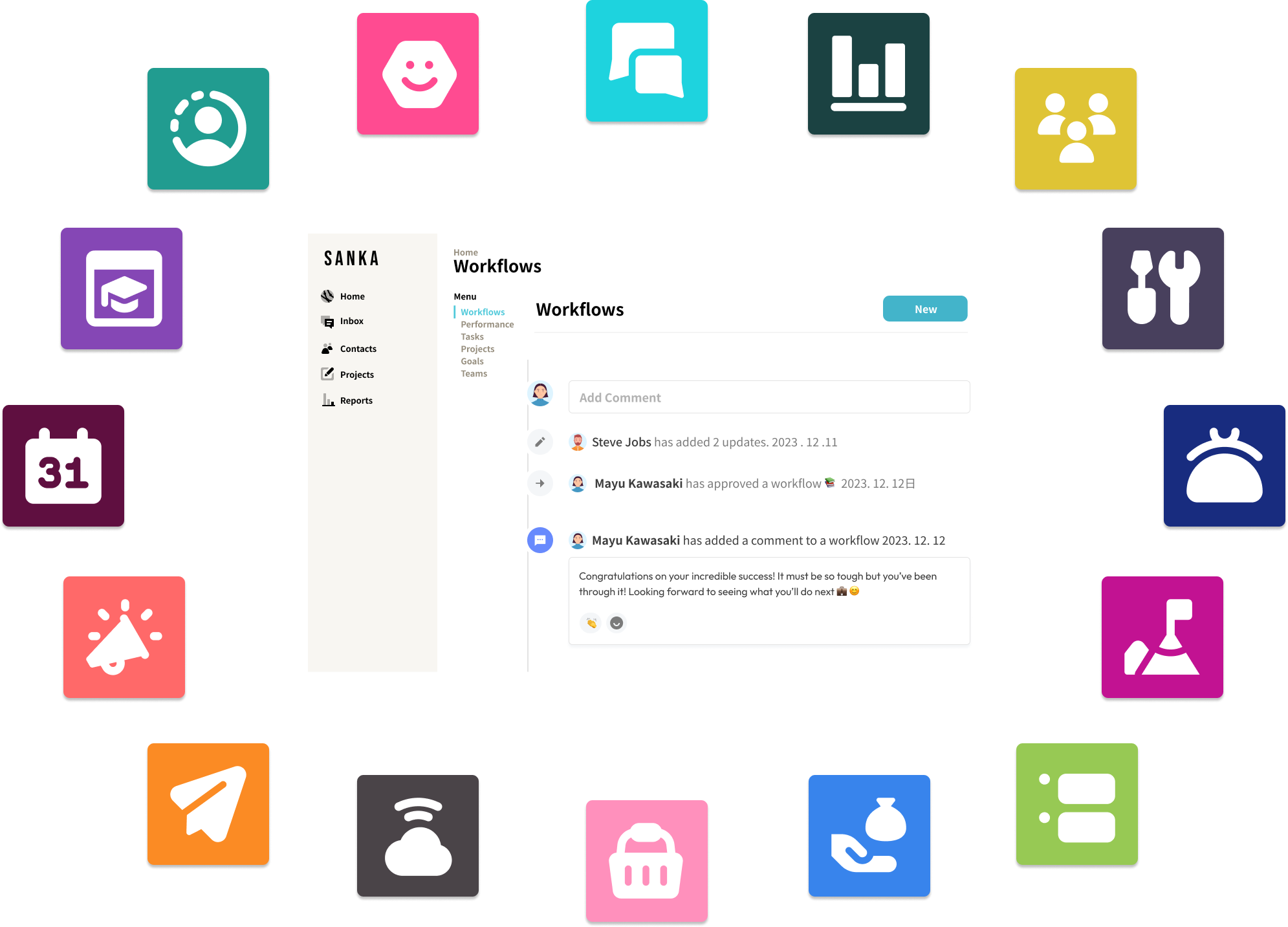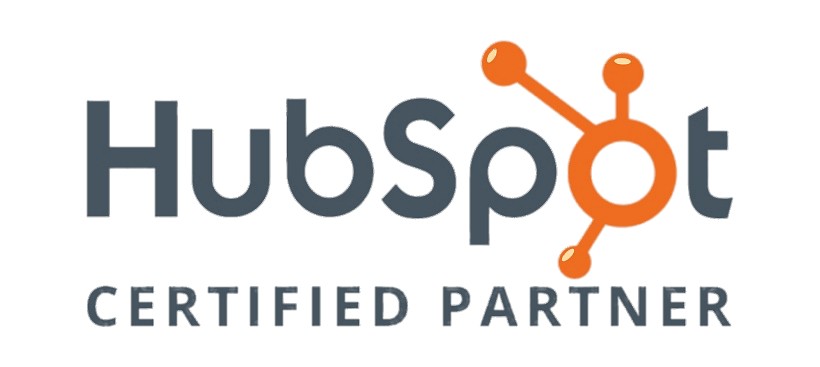Introduction
In the world of business technology, businesses must leverage a variety of tools and strategies to effectively manage customer relationships, streamline marketing efforts, and enhance sales productivity.
Three such powerful tools that businesses commonly employ are Customer Relationship Management (CRM), Marketing Automation (MA), and Sales Force Automation (SFA).
While these tools are closely related, each one serves a unique purpose.
Understanding the differences between CRM, MA, and SFA and their respective roles in a business context is crucial for any organization aiming to thrive in a competitive business landscape.
In this blog post, we'll dive deep into the difference between CRM, MA, and SFA and explore why they are vital to businesses.
What is CRM: Customer Relationship Management?
Customer Relationship Management (CRM) is a strategy, supported by tools and technologies, to manage all the company's interactions with its existing and potential customers.
The primary goal of CRM is to improve business relationships, enhance customer retention, and drive sales growth.
CRM systems compile customer data from various channels, providing complete profiles that include customer personal information, purchase history, buying preferences, and concerns.
This detailed customer knowledge allows businesses to tailor their products, services, and interactions according to the customers' needs, leading to a more personalized and satisfying customer experience.
Key features of CRM
Contact Management
CRM tools create a centralized hub for storing all customer data. This includes contact details, communication history, transaction records, and more, helping businesses manage their relationships effectively.
Interaction Tracking
CRM systems track every interaction with customers, providing insights into consumer behavior and preferences, that pave the way for personalized customer experiences.
Sales Pipeline Management
CRM solutions offer a visual representation of sales processes. Sales teams can track customer journeys, identify bottlenecks, and implement strategies to optimize their sales pipeline.
Task Management
CRM systems allow you to track and manage various tasks, such as following up on leads or contacting clients, ensuring nothing falls through the cracks.
Report Generation
CRM solutions provide robust reporting features, helping businesses gain insights into sales performance, customer behaviors, and more.
A Harvard Business Review article argues that effectively implemented CRM systems tend to create customer satisfaction and long-term loyalty, which eventually translates into higher profits.
Why is Customer Relationship Management (CRM) Important?
CRM, or Customer Relationship Management, is an instrumental tool for businesses of all sizes. Its importance spans various aspects of a business, from building constructive relationships with customers to streamlining operations and improving profitability.
#1 Enhanced Customer Relationships
The foundation of any successful business is its relationships with customers.
CRM systems help establish and manage these relationships by providing comprehensive profiles of customers, tracking their interactions with your business, and forecasting their future needs.
This insight helps your team personalize outreach and service, leading to higher customer satisfaction.
#2 Improving Business Performance and Profitability
At its core, CRM is designed to improve business profitability. By automating administrative tasks, CRM allows your team to focus on what they do best: nurturing leads and closing deals.
Moreover, CRM can help you identify high-value customers and tailor your marketing efforts to engage them effectively.
#3 Sales Process Optimization
CRM is an invaluable tool in managing and optimizing sales processes. It provides sales teams with in-depth information about leads and customers, enabling them to tailor their sales pitches effectively.
CRM also provides real-time insights into the sales pipeline, helping identify bottlenecks and areas for improvement.
#4 Accurate Forecasting
CRM tools come equipped with robust data analysis and reporting features. By utilizing historical data and real-time insights, CRM can provide accurate sales forecasts and help identify market trends and customer behavior patterns.
This information benefits businesses by guiding strategic decision-making and planning for growth.
#5 Centralized Data
One of the key advantages of CRM is its ability to store all customer information in a centralized location.
This enables any team member to access updated information from anywhere and at any time, promoting collaboration and ensuring everyone has a unified view of the customer.
#6 Enhanced Customer Service
CRM isn't just about sales; it's integral to delivering exceptional customer service. By tracking customer interactions and support inquiries, CRM enables businesses to respond to issues promptly and accurately.
It can even predict customer needs, allowing businesses to proactively address potential problems before they become critical.
#7 Technology Integration
CRM systems can integrate with other business tools like email systems, marketing automation software, and social media platforms.
This seamless interoperability simplifies information flow, boosts productivity, and extends the power of your existing tech stack.
According to a report by Grand View Research, the global customer relationship management market size was valued at USD 58.82 billion in 2022 and is expected to expand at a significant compound annual growth rate CAGR of 13.9% from 2023 to 2030.
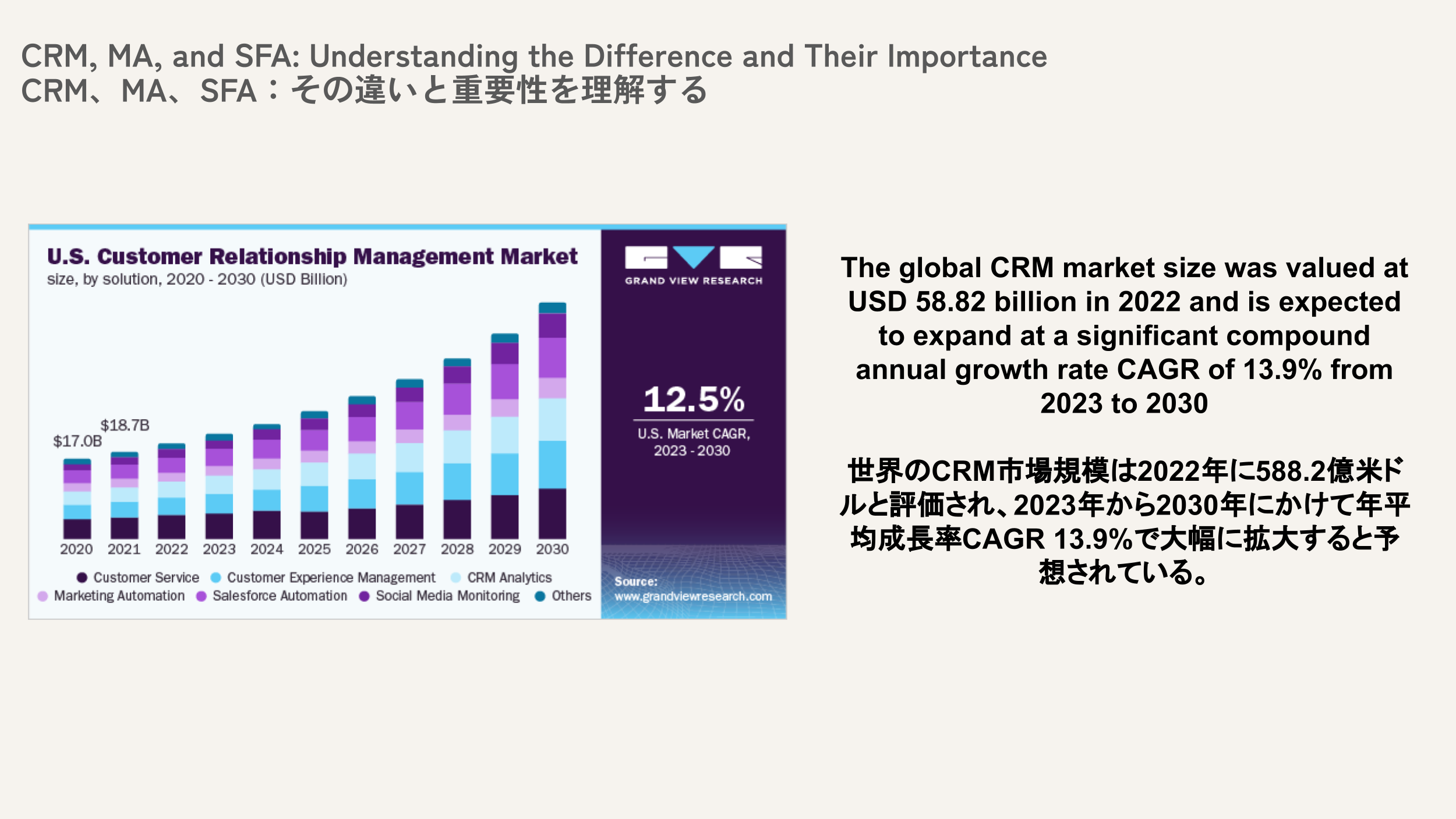
This enormous growth can be attributed to the increasing demand for CRM solutions due to their role in enhancing the customer experience and improving operational efficiency.
What is MA: Marketing Automation?
Marketing Automation (MA) refers to the use of software and technologies to automate, streamline, and analyze marketing tasks and workflows.
These tasks may include email marketing, social media posting, customer segmentation, lead nurturing, and more.
By automating these repetitive tasks, businesses can enhance efficiency, reduce human error, and free up time for more strategic endeavors.
With the help of MA, businesses can provide a personalized experience to their customers, effectively engage with them, and build stronger, long-lasting relationships.
Moreover, it provides valuable insights into customer behavior and campaign performance, informing smarter business decisions.
Key features of MA
MA tools automate repetitive marketing tasks, empowering businesses to engage customers more effectively. Here are some key features:
Email Campaigns
MA tools enable businesses to send automated emails based on specific triggers or schedules, streamlining lead nurturing processes.
Lead Scoring
MA solutions score leads based on their interactions with your brand, allowing sales teams to prioritize their efforts on high-potential leads.
Customer Segmentation
MA helps segregate the customer base into various segments based on their behavior, preferences, or characteristics. This helps in creating personalized campaigns.
Drip Campaigns
This feature allows businesses to schedule a series of marketing messages to be sent out automatically at specified intervals.
Campaign Analytics
Mature MA solutions provide analytics to evaluate the efficacy of marketing campaigns, helping businesses refine their strategies over time.
Why is Marketing Automation (MA) Important?
Marketing Automation (MA) has become a necessary tool for businesses looking to streamline their marketing efforts and increase efficiency.
By automating recurring tasks and coordinating actions across multiple channels, MA allows businesses to proactively engage customers and accelerate growth.
Let's dive deep into why MA is so crucial to modern marketing strategies.
#1 Time and Cost Efficiency
One of the most significant benefits of MA is the automation of time-consuming, repetitive tasks.
As a result, marketers have more time to focus on designing and implementing strategic campaigns rather than getting bogged down with administrative tasks.
Reducing the time spent on routine jobs also leads to substantial cost savings in the long run.
#2 Personalized Customer Experience
Through MA, businesses have the ability to segment their audience based on their behavior, interests, and demographics.
This enables the delivery of personalized content tailored to individual customers or groups, thereby greatly enhancing the customer experience and increasing the odds of conversion.
#3 Consistent Multichannel Marketing
In today's digital world, customers interact with brands through multiple touchpoints – be it social media, email, web, or mobile.
MA allows businesses to maintain a consistent brand voice and message across all these channels.
This ability not only boosts brand recognition and trust but also improves the chances of engaging customers at the right time and place.
#4 Improved Customer Engagement
MA tools enable businesses to nurture leads effectively by setting up trigger-based communications.
This ensures continuous engagement and keeps your brand at the forefront of potential customers' minds.
As a result, you can maintain a healthy sales pipeline and improve conversion rates.
#5 Enhanced Performance Analysis
One of the most valuable aspects of MA tools is their ability to track and analyze campaign performance.
By leveraging in-built analytics, marketers can obtain actionable insights and understand what resonates with their audience.
This wealth of data enables constant fine-tuning of marketing strategies to optimize ROI.
#6 Improved Sales and Marketing Alignment
Often, there's a disconnect between the sales and marketing departments, leading to lost opportunities.
MA helps bridge this gap by offering lead scoring capabilities. Marketers can rank leads based on predefined criteria.
Then, sales teams can prioritize these qualified leads, resulting in improved close rates.
#7 Scaling Marketing Efforts
As a business grows, so do its marketing demands. MA solutions help meet these growing needs without requiring proportionate increases in resources or manpower.
By automating and coordinating marketing efforts, businesses can scale their marketing strategies while ensuring a high level of personalization and engagement.
A report by Email Monday quotes that 91% of the most successful users agree that marketing automation is "very important" to the overall success of their marketing across channels.
The data signifies how MA has become a crucial element in successful marketing strategies, driving growth and enhancing ROI.
What is SFA: Sales Force Automation?
Sales Force Automation (SFA) is a subset of CRM and is focused on automating the business tasks of sales, including order processing, contact management, inventory monitoring, and sales forecast analysis.
These tools enable sales teams to work more effectively, strategically target resources, and improve customer relationships.
Key features of SFA
SFA tools aim to automate various business tasks of sales. Here are some key features:
Opportunity Management
SFA solutions provide powerful tools to identify and track potential sales opportunities.
Sales Forecasting
Using historical data and predictive algorithms, SFA tools aid in projecting future sales, helping with resource planning and strategy formulation.
Order Management
From order generation to invoice creation, SFA solutions manage the entire order process, ensuring timely deliveries and customer satisfaction.
Contact Management
Similar to CRM, SFA tools provide comprehensive contact management, allowing sales teams to store and manage customer information effectively.
Task Management
Automated reminders and task allocation help ensure important sales activities are efficiently tracked and completed.
Why is Sales Force Automation (SFA) Important?
Sales Force Automation (SFA) is an indispensable tool that helps businesses streamline their sales processes, increase productivity, and ultimately enhance bottom-line performance.
By automating crucial, yet repetitive, sales tasks and providing comprehensive customer insights, SFA enables sales teams to work more efficiently and close more deals.
#1 Boosting Sales Team Productivity
One of the significant benefits of SFA is its ability to automate routine sales tasks.
These include tracking customer interactions, managing contacts, sending follow-up emails, etc.
By automating these activities, salespeople can dedicate more time and effort to engage with potential customers, effectively boosting productivity and sales.
#2 Streamlined Sales Process
SFA systems offer robust tools to visualize and manage the entire sales pipeline.
By providing real-time updates on every aspect of the sales process, from lead generation to closing deals, SFA allows sales teams to identify bottlenecks, streamline their approach, and efficiently manage their sales activities.
#3 Accurate Sales Forecasting
Through data analysis and predictive modeling, SFA systems offer accurate sales forecasting.
This feature allows the sales team and business leaders to get a realistic view of their sales revenue.
Such insights facilitate strategic decision-making, resource allocation, and business planning.
#4 Enhanced Customer Relationships
Leveraging the data stored in the SFA, sales teams can gain a comprehensive understanding of their customers, including their preferences, needs, past purchases, and interactions with the business.
This detailed customer knowledge allows for personalized communication, fostering stronger relationships and improving customer satisfaction and loyalty.
#5 Mobility and Real-Time Information
Most SFA systems now offer mobile applications, providing sales reps with real-time customer information and updates, even while on the go.
This feature ensures that salespeople can respond promptly to leads and customer inquiries, improving efficiency and customer service levels.
#6 Improved Collaboration and Data Sharing
SFA solutions provide a platform for easy and effective communication between the sales team and other departments, like marketing and customer support.
By sharing customer information and insights, these teams can align their strategies to provide a unified customer experience, boosting customer satisfaction and retention rates.
#7 Boosting Revenue Growth
By increasing sales efficiency, enhancing customer satisfaction, and providing deep business insights, SFA systems play a crucial role in accelerating business growth.
As more leads are converted, and customer retention rates improve, businesses can expect an uptick in their revenues and profitability.
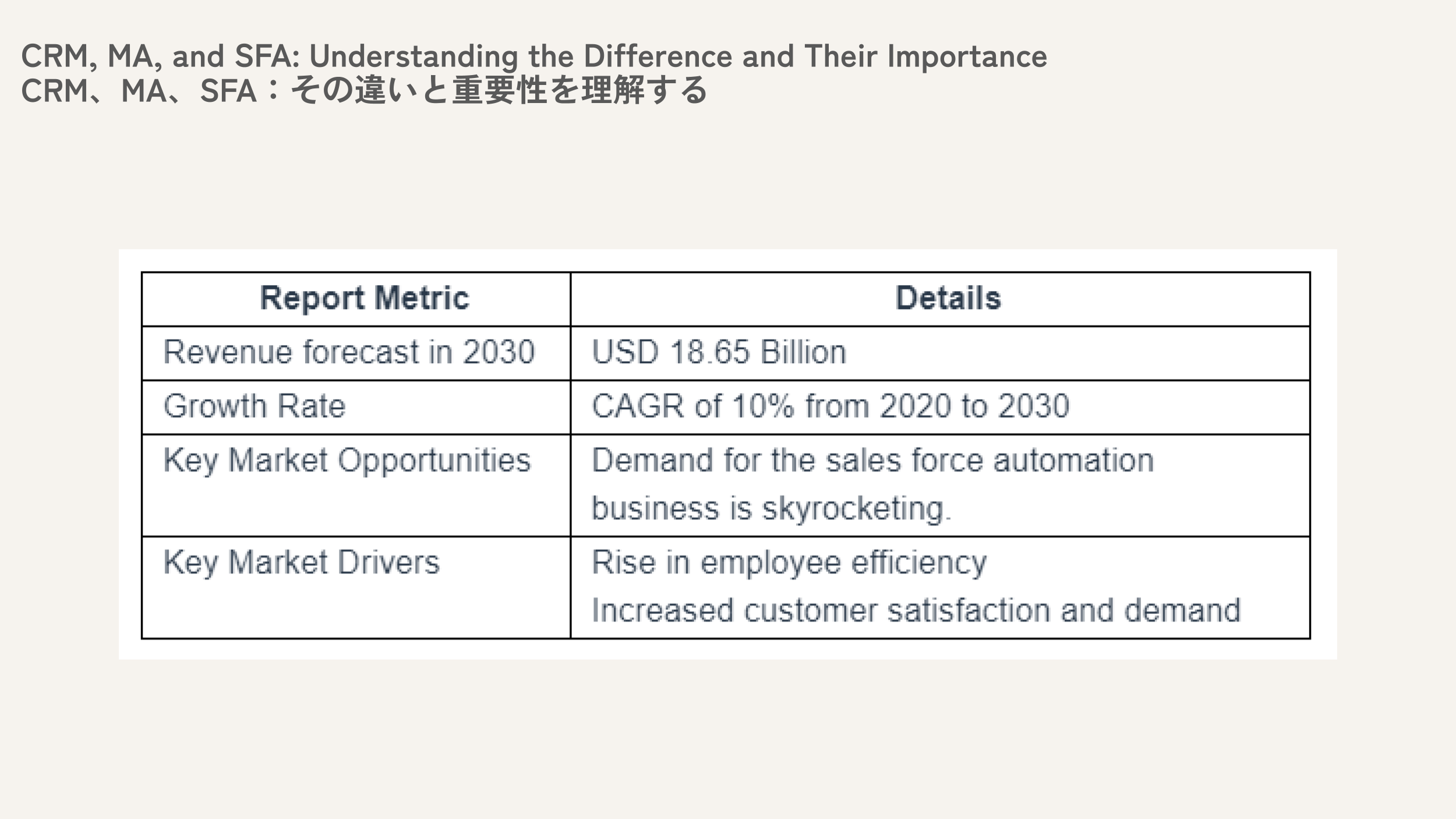
According to a report by GlobeNewsWire, the global sales force automation market was valued at USD 7.75 billion in 2020, and is expected to reach USD 13.82 billion by 2027, growing at a CAGR of 8.5% during the forecast period.
These figures reflect the growing recognition of the importance of SFA by businesses worldwide and its role in enhancing sales efficiency and productivity.
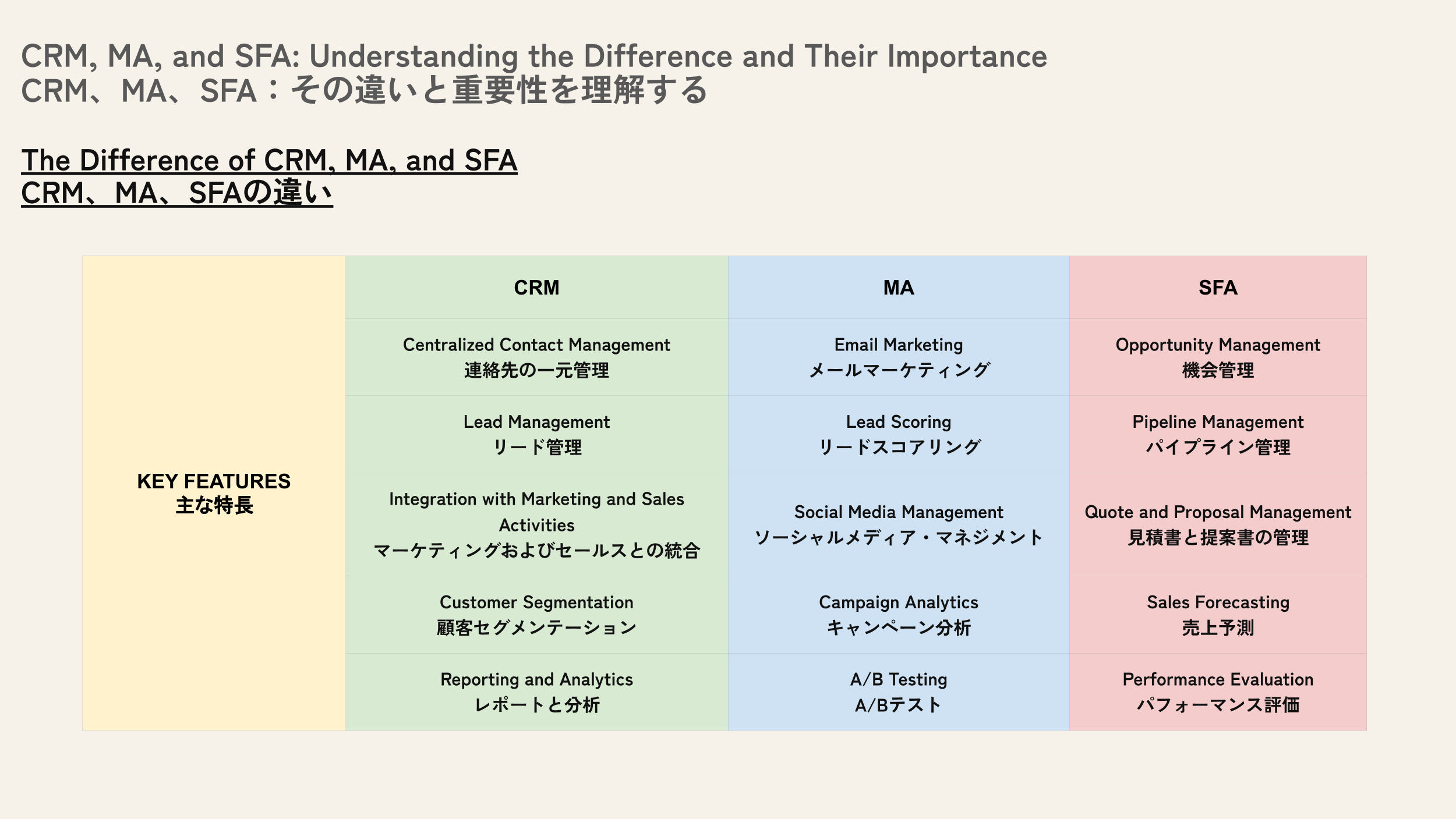
Conclusion
In an age fueled by technology, tools such as CRM, MA, and SFA have emerged as vital aids for businesses aiming to remain competitive, increase efficiency, and develop stronger relationships with customers.
While they all share the common goal of improving business outcomes, they each cater to unique aspects - CRM delivering top-notch customer management, MA revolutionizing marketing strategies, and SFA empowering your sales force.
While each has a unique purpose, when integrated, they provide a powerful toolkit for businesses to bolster their customer relationships, streamline operations, and drive growth.
Prepare your business for sustained success in this digital age by embracing these transformative tools today.
Remember, in the race to business efficiency and customer satisfaction, technology is your strongest ally.

